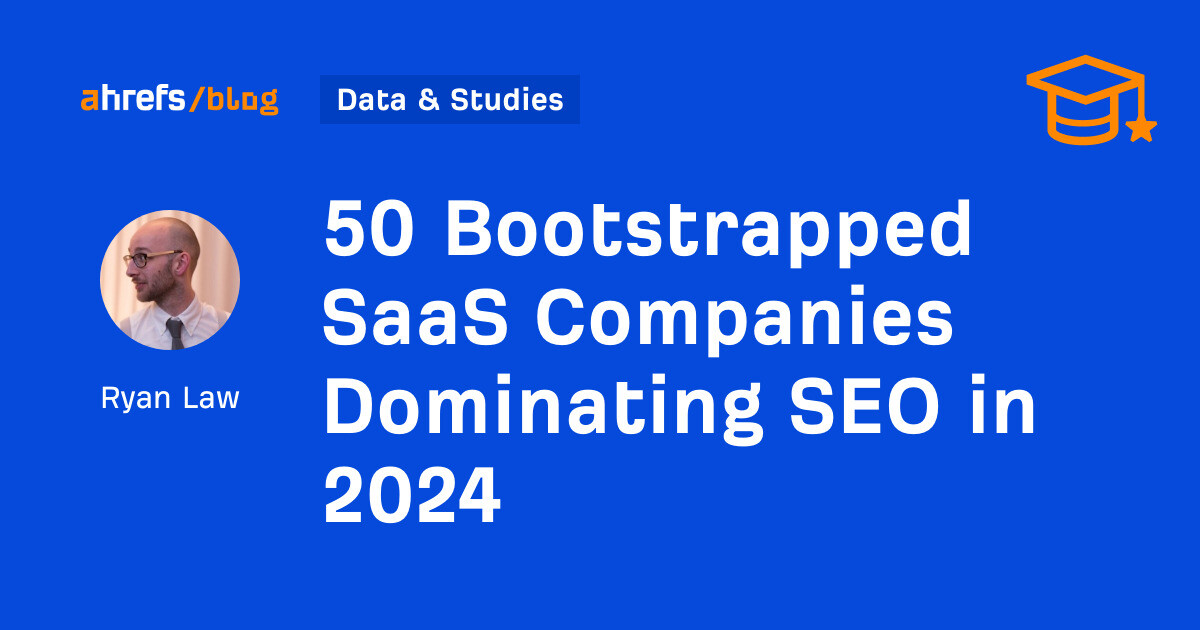Creating an Instagram SEO strategy is critical for marketers as the platform has become more popular than social media giants Twitter and LinkedIn.
SEO for Instagram is how you can create opportunities for those billions of users to see your content and engage with your brand. Luckily, you can apply the same SEO techniques you use to optimize web page content to drive organic growth to your Instagram account.
Think of Instagram as its own search engine. The platform has built-in search functions that act like its own mini-Google. Here, we’ll share 10 SEO techniques to expand your reach by working with the Instagram algorithm.
Table of Contents
Instagram Optimization
1. Optimize your Instagram profile.
The first step you should take toward increasing your Instagram reach is to optimize your Instagram profile. Driving traffic to your Instagram account won’t benefit you in the long run if your profile isn’t optimized for the best user experience.
Here are a few tricks for optimizing your Instagram profile:
- Make your profile public.
- Choose a colorful, on-brand profile image.
- Create a recognizable and searchable @Username.
- Create an easily searchable business name.
- Register for an Instagram Business account.
- Include a trackable link in your bio.
Why it’s so important: These steps might seem like a no-brainer, but it’s critical to lay the groundwork before you make any other SEO changes. Once you’ve covered these basics, you can move on to more technical optimizations.
2. Have a primary keyword.
Your display name and @username are the two most important places to put your primary keyword. When users type their intention into the search bar, you’ll match, bringing you closer to that coveted top-of-search position.
To start, you’ll need to pinpoint your primary keyword. We’ll use a bakery as our example. When an Instagram user is looking to fill their news feed with baked goods, they’ll likely search the keyword “bakery.”
When you have this keyword in your display name and @Username, you’re more likely to appear in the suggested accounts search results.
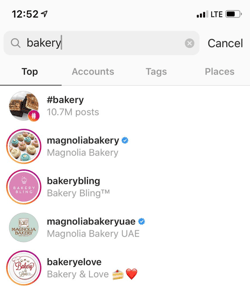
As you can see here, four of the top five search results for bakery have that keyword in both their display name and @Username.
Pro tip: One or the other is simply not as powerful. To get the most out of your Instagram optimization, you should use your primary keyword in both places to increase your chances of being picked up by the algorithm.
This may be heartbreaking if you were excited about what you’d chosen when opening your account, but the change is a smart move toward optimization — and ultimately your own success!
3. Include a secondary keyword.
Now that you’ve taken care of your primary keyword, it’s time to get the most out of your secondary keywords. Secondary keywords are the phrases and topics that orbit your primary keyword.
If your primary keyword is “bakery,” your secondary keywords might be things like “cupcakes,” “wedding cakes,” “baked goods,” etc.
Let’s take a look at Magnolia Bakery, the top result for this keyword — their primary keyword is outlined in red, and their secondary keywords are outlined in orange:
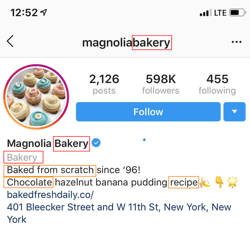
Magnolia Bakery has done a great job crafting an informative and fun bio, while still including a few important search-optimized keywords. A person looking for baked goods would likely follow Magnolia if they found them in the search, as the account matches the user’s search intent.
Pro tip: Secondary keywords are like a safety net — they catch the people who might not be searching for your primary keyword but could still be interested in your product.
Language differences cause many people to use different words when looking for the same thing, so be sure to consider synonyms that could also make good secondary keywords.
4. Treat your hashtags like keywords.
Once you’ve optimized your profile, it’s time to optimize your posts. This is an ongoing process that requires special attention. Most users aren’t going to look for you directly. They’ll likely discover you through a hashtag on a specific post.
That’s why each of your Instagram posts should have its own hashtag strategy. You should treat these hashtags like secondary keywords. Check out the example from CorePower Yoga below:
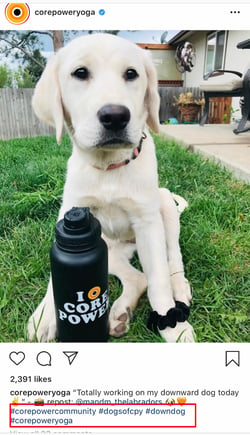
They include their own brand name in two of the hashtags — #corepowercommunity and #corepoweryoga. The other two hashtags, however, are specifically for this image.
By including a variety of post-specific hashtags, CorePower increases its chances of attracting a broader, more diverse audience — people who search for terms related to yoga but also people who search #downdog.
This gives users a better chance of finding you than if you used the same five hashtags on every post. Variety and relevance are your keys to success.
Best for: All content types – this hashtag advice holds true for posts, reels, IGTV, and all the other types of content you add to the platform. Make any content you’re crafting as searchable as possible for the best results.
5. Place your hashtags strategically.
Now, where do you put those cleverly optimized hashtags? Previously, the common practice was to put them in the comments, but times have changed.
It’s important to adjust your Instagram optimization strategy when you’re given credible advice from, say, the company’s CEO.
According to Head of Instagram Adam Mosseri, the algorithm now likes it when you add your hashtags in captions. He released a video in late 2021 letting us know how to appease the algorithm.
What we like: Videos like that one from the IG CEO are a great resource for honing your Instagram SEO strategy, and there are lots out there that can help, like this one.
6. Leverage your image captions.
In addition to adding hashtags to the end, the image caption itself is another opportunity to optimize.
Keep your content authentic to fit your image, but be sure to fold in some of your brand’s secondary keywords. Craft a compelling, engaging caption to satisfy existing followers, and make it keyword rich to attract new ones.
A robust caption can do more than just catch a user’s attention — it can also help you show up in search. Using secondary keywords in the caption allows the algorithm to determine that you’re what your unique audience is looking for.
The example below shows how DIFF eyewear manages to use keywords in their caption that will bring in the right users.

Best for: Leveraging your image captions helps create a complete picture for Instagram’s algorithm and tells it that you should be ranking high in their search for those terms.
7. Take advantage of Instagram alt text.
Instagram’s alt text feature was designed to help visually impaired users enjoy their Instagram experience, but it can also be used for SEO.
Instagram will automatically populate alt text options ifyou skip this step. Still, it’s better to do it yourself to ensure the caption matches what’s actually in the photo and puts it in context with your brand.
To access your alt text options, advance to the screen just before you share your photo and click the “advanced settings” tab at the bottom.
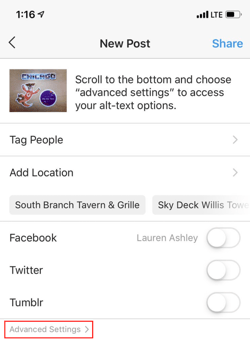
Once you’ve done that, scroll to the bottom to where it says “Accessibility” and select the “Write Alt Text” option. From there, you can craft the perfect image description!
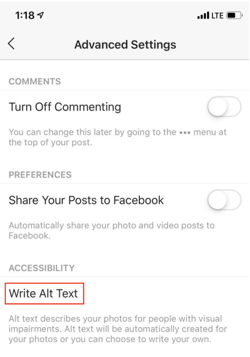
Once you’ve crafted your own alt text, share your photo as normal. The benefits of changing your Instagram alt text are the same as when you use alt text on photos for your website.
What we like: Optimizing your alt text can help your posts rank better in the algorithm, and what’s more, it also adds the possibility of having your results pulled for voice search, too!
8. Track everything with analytics.
If this is your first time using SEO techniques to grow, then you should be tracking how your new Instagram strategy impacts your overall social media goals.
While Instagram does have an in-platform analytics feature, it only allows you to pull data from a certain date. Once that window closes, the data is lost and replaced. While that might be fine for the casual user, it’s not ideal for marketing purposes.
Social media tools like Hootsuite, IconoSquare, or Sprout Social allow you to bypass this with robust data analytic tracking services, automated reports, and more. They allow users to analyze post and campaign performance so you can optimize your content for the future.
Best for: Collecting the hard data behind your content plan. Tracking the success of your new Instagram SEO strategy will help you refine your content as you go, gain buy-in from leadership, and improve the overall success of your strategy.
9. Avoid these black hat SEO techniques.
You might think that Google is the only website sophisticated enough to spot and punish users for using black hat SEO tactics. However, with the expansion of AI to handle the dense computational minutiae, those days are over.
Instagram has been cracking down on accounts that try to cheat the system.
Infamously, they’ve implemented a shadowban for users that break the rules. This makes it so nobody can see your content when they click on a hashtag you’ve used. Even your followers can’t see that content unless they specifically search for your account and visit your profile.
- Don’t steal content.
- Don’t use bots.
- Don’t keyword stuff.
- Don’t follow too many accounts too fast.
- Don’t buy followers.
Pro tip: SEO is a long-term strategy, and it can be frustrating when you don’t see results immediately. The quick fix can be tempting, but the results can be disastrous if you get caught. If you’re looking to build your Instagram account the right way, avoid these tactics at all costs.
10. Navigate banned hashtags.
There are some strange realities in tech right now: AI art programs crank out nightmarish hands (Google at your own risk), cryptocurrency connects directly to environmental decline, and Instagram has some weirdly banned hashtags.
Some content creators knowingly take advantage of hashtags to promote illicit content. #costumes, for example, could be popular around Halloween.
You can also imagine how that can quickly lead to problematic content in terms of indecent exposure and violating children’s rights.
Additionally, Instagram doesn’t want you to direct traffic away from the platform by using hashtags affiliated with other social media platforms. If you use #snapchat, you tempt the algorithm to flag you for a shadowban or even permanently ban you from the IG platform.
Pro tip: You can check recently compiled lists of banned hashtags, or you can take things into your own hands by searching for the hashtag you’re considering using. If content shows up and flows freely, it’s not banned.
If you get the dreaded “Recent posts from [the hashtag you searched for] are currently hidden”, then you know not to use that hashtag.
Do It For the ‘Gram
SEO may be primarily used for website optimization, but that doesn’t mean you can’t use what you’ve learned for social media, as well.
Take these tips and transform your Instagram presence in a way that puts the user first while also building your reach.

![New Data: Instagram Engagement Report [Free Download]](https://no-cache.hubspot.com/cta/default/53/9294dd33-9827-4b39-8fc2-b7fbece7fdb9.png)



![How to Optimize for Google’s Featured Snippets [Updated for 2024]](https://moz.com/images/blog/Blog-OG-images/How-to-Optimize-for-Googles-Featured-Snippets-OG-Image.png?w=1200&h=630&q=82&auto=format&fit=crop&dm=1724004002&s=13df73104762982790dab6dc8328023f)

